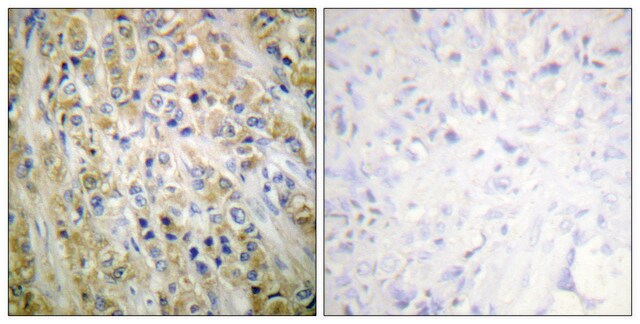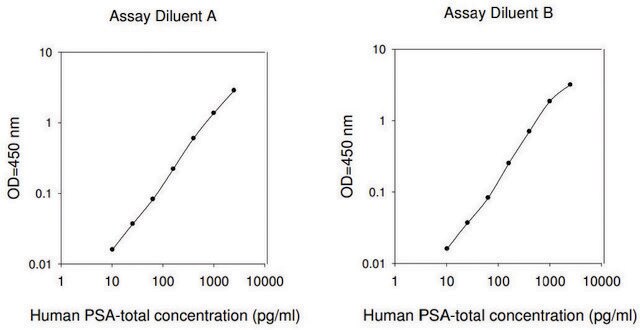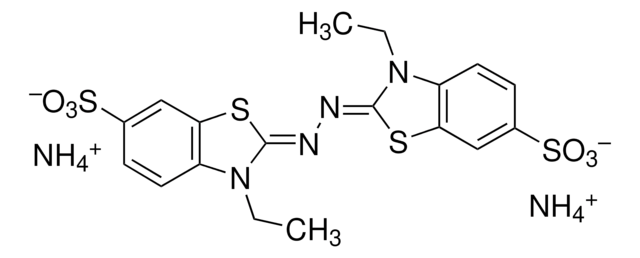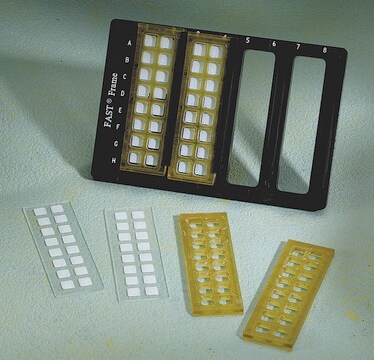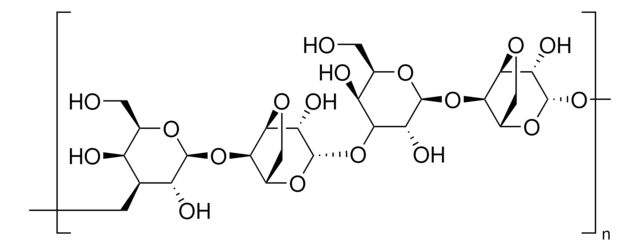P3235
Prostate Specific Antigen from human semen
buffered aqueous solution
Sinónimos:
Cancer-associated PSA, PSA
Iniciar sesiónpara Ver la Fijación de precios por contrato y de la organización
About This Item
Productos recomendados
biological source
human semen
Quality Level
assay
≥99% (SDS-GE)
form
buffered aqueous solution
UniProt accession no.
shipped in
wet ice
storage temp.
−20°C
Gene Information
human ... KLK3(354)
¿Está buscando productos similares? Visita Guía de comparación de productos
General description
Prostate specific antigen (PSA) is a 26kDa single-chain glycoprotein containing 237 amino acids, encoded by the kallikrein gene mapped to human chromosome 19. It is specifically expressed by human prostate tissue and is a highly abundant proteolytic enzyme expressed in the seminal fluid.
Biochem/physiol Actions
Prostate Specific Antigen (PSA), a glycoprotein of the glandular kallikrein family, is a serine protease with chymotrypsin-like enzymatic activity. Circulating PSA exists in free and protease inhibitor-bound forms. Studying the ratios of free to inhibitor-bound forms may prove valuable in the diagnosis of prostate cancer.
Prostate-specific antigen (PSA) is an androgen-regulated serine protease specifically produced by prostatic tissue and is secreted into the lumen. PSA in semen cleaves semenogelins present in the seminal coagulum. Total PSA levels are increased in serum of prostate cancer (PCa) patients. PSA functions as a potential biomarker for PCa. Serum protease inhibitors such as α1-antichymotrypsin (α1-ACT), α2-macroglobulin (α2-M) and other acute-phase proteins form irreversible complexes with circulating PSA and hinder proteolytic activity of PSA.
Physical form
Solution in 10 mM Tris, 0.1% sodium azide, pH 8.0
Storage Class
11 - Combustible Solids
wgk_germany
WGK 3
flash_point_f
Not applicable
flash_point_c
Not applicable
Elija entre una de las versiones más recientes:
¿Ya tiene este producto?
Encuentre la documentación para los productos que ha comprado recientemente en la Biblioteca de documentos.
Los clientes también vieron
Structure, function, and regulation of the enzyme activity of prostate-specific antigen.
Lilja H
World Journal of Urology, 11(4), 188-191 (1993)
Multiple forms of prostate-specific antigen in serum: differences in immunorecognition by monoclonal and polyclonal assays.
Zhou AM
Clinical Chemistry, 39(12), 2483-2491 (1993)
Qian Dang et al.
Analytical and bioanalytical chemistry, 408(25), 7067-7075 (2016-03-05)
A simple and sensitive electrogenerated chemiluminescence biosensor was developed to monitor matrix metalloproteinase 2 (MMP-2) by employing a specific peptide (CGPLGVRGK) as a molecular recognition substrate. Bis(2,2'-bipyridine)-4'-methyl-4-carboxybipyridine-ruthenium N-succinimidyl ester-bis(hexafluorophosphate) (Ru(bpy)2(mcbpy-O-Su-ester)(PF6)2 (Ru1) was used as ECL-emitting species and covalently labeled onto
Steven P Balk et al.
Journal of clinical oncology : official journal of the American Society of Clinical Oncology, 21(2), 383-391 (2003-01-15)
Prostate-specific antigen (PSA) is an androgen-regulated serine protease produced by both prostate epithelial cells and prostate cancer (PCa) and is the most commonly used serum marker for cancer. It is a member of the tissue kallikrein family, some of the
D A Armbruster
Clinical chemistry, 39(2), 181-195 (1993-02-01)
Prostate-specific antigen (PSA) is a glycoprotein produced exclusively by prostatic tissue. PSA's absolute tissue specificity makes it valuable as a forensic marker and, more important, as a tumor marker for prostatic cancer. Prostatic cancer is prevalent in the older male
Nuestro equipo de científicos tiene experiencia en todas las áreas de investigación: Ciencias de la vida, Ciencia de los materiales, Síntesis química, Cromatografía, Analítica y muchas otras.
Póngase en contacto con el Servicio técnico
